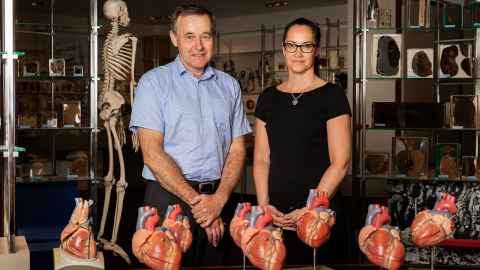Research into heart disease the driving force for Manaaki Mānawa
1 March 2021
A new fundraising appeal will support heart research being undertaken at Manaaki Mānawa, the Centre for Heart Research.

Given that cardiovascular disease is New Zealand’s biggest killer, it’s hard to believe we haven’t had a dedicated national research centre focusing on heart disease.
But now we have – and the University of Auckland is at the heart of it.
The University of Auckland-based Centre for Heart Research is called Manaaki Mānawa, and the name means ‘preserving the life force of the heart’.
Manaaki Mānawa, in the Faculty of Medical and Health Sciences, is the host of Healthy Hearts for Aotearoa New Zealand (HHANZ), the new Centre of Research Excellence (CoRE) that’s an integrated national network of heart researchers, clinicians and community experts from around the country. Base government funding for the network is for seven and a half years, but each heart research centre is expected to raise additional funding for research.
“The government has recognised the chronic issue around cardiovascular disease, particularly the inequity around Māori and Pacific,” says Manaaki Mānawa’s director, Professor Julian Paton.
“Most families experience or suffer from cardiovascular disease. Unlike pandemics that will go away one day, heart disease has not gone away. We can slow it down but it would be wonderful to think that in the future we could completely reverse it or prevent it.”
Julian arrived at the University three years ago, from the University of Bristol, to create Auckland’s heart research centre. He says the city has a unique environment, where research is being done right on the doorstep of a main hospital and multiple disciplines can be integrated.
Unlike pandemics that will go away one day, heart disease has not gone away. We can slow it down but it would be wonderful to think that in the future we could completely reverse it or prevent it.
One of the centre’s big achievements to date is setting up the Cardiac Inherited Diseases Registry, recording details of patients who have been saved from sudden cardiac death events.
“This has enabled us to alert family members to the possibility that they may have these mutations. It has allowed subsequent genotyping, which has then made them aware of whether or not they are at risk.”
Another example of research is the Multi-Ethnic New Zealand Study of Acute Coronary Syndrome (MENZACS). In this study, samples are taken from people who have had a heart attack to find out more about the factors that predisposed them to it. It is the first such local study to look at ethnicity differences.
Julian says a key vision for Manaaki Mānawa is to achieve heart health equity in Aotearoa.
“Maori and Pacific people don’t live as long as non-Maori and Pacific, by about seven to eight years, predominantly because of heart disease. New Zealand has a unique and diverse population and we need to move away from a one size fits all strategy to solve the problem of heart failure for the benefit of all people in Aotearoa.”
Dr Anna Rolleston co-chairs the Māori advisory group for Manaaki Mānawa and says researchers will collaborate with Māori and Pacific communities.
“One of our goals is for the community to feel like they have a voice. I don’t think many clinicians and researchers go out to the community to talk to them. But we need to do something different to make a difference.
“We hope Manaaki Mānawa will be like a blueprint for other health research groups that need to collaborate more.”
Helen Borne